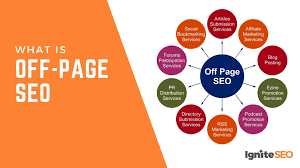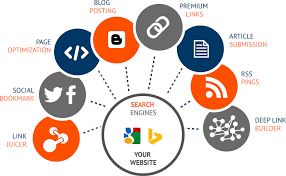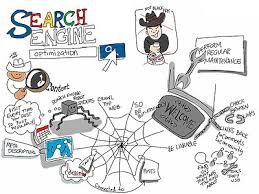The Importance of On-Page and Off-Page SEO in Digital Marketing
Search Engine Optimization (SEO) is a crucial component of any successful digital marketing strategy. It involves various techniques and practices aimed at improving a website’s visibility and ranking on search engine results pages (SERPs). Two key aspects of SEO are on-page and off-page optimization, each playing a distinct role in enhancing a site’s performance.
On-Page SEO
On-page SEO refers to the optimisation efforts made directly on the website itself. This includes factors such as content quality, keyword usage, meta tags, internal linking structure, site speed, and mobile-friendliness. By focusing on these elements, webmasters aim to make their site more user-friendly and relevant to search engines.
One of the primary goals of on-page SEO is to provide valuable and informative content that addresses the needs of users. By incorporating relevant keywords naturally within the content and meta tags, websites can signal their relevance to search engines like Google. Additionally, optimising images, headings, and URLs can further enhance the overall user experience.
Off-Page SEO
Unlike on-page SEO, off-page SEO involves activities conducted outside the website to improve its authority and reputation. This includes link building, social media marketing, influencer outreach, guest blogging, and online reputation management. These efforts aim to establish a website’s credibility and trustworthiness in the eyes of both users and search engines.
Link building is a critical aspect of off-page SEO as it signals to search engines that other websites consider your site valuable enough to link back to it. Quality backlinks from reputable sources can significantly boost a site’s ranking in SERPs. Social media marketing also plays a vital role in off-page SEO by increasing brand visibility and driving traffic back to the website.
The Synergy Between On-Page and Off-Page SEO
While on-page and off-page SEO are distinct strategies, they work hand in hand to improve a website’s search engine performance. A well-optimised website with high-quality content will naturally attract backlinks from other sites through off-page efforts. Conversely, strong backlink profiles resulting from off-page activities can enhance a site’s authority and relevance for targeted keywords.
In conclusion, both on-page and off-page SEO are essential components of a comprehensive digital marketing strategy. By implementing best practices in both areas, webmasters can improve their site’s visibility, attract organic traffic, and ultimately achieve higher rankings in search engine results pages.
Maximising Online Visibility: The Synergy of On-Page and Off-Page SEO Strategies
- On-Page SEO allows for direct control over website elements like content, meta tags, and internal links.
- Off-Page SEO helps build a website’s authority and credibility through quality backlinks from other sites.
- Both On-Page and Off-Page SEO contribute to improving a site’s visibility in search engine results pages (SERPs).
- On-Page SEO enhances user experience by focusing on content relevance, keyword usage, and site structure.
- Off-Page SEO activities like social media marketing can increase brand awareness and drive traffic to the website.
- A well-executed On-Page SEO strategy can lead to higher organic search rankings for targeted keywords.
- Off-Page SEO efforts such as influencer outreach and guest blogging can expand a website’s online reach.
- The synergy between On-Page and Off-Page SEO results in a comprehensive digital marketing strategy that yields long-term benefits.
Challenges of On-Page and Off-Page SEO: Time, Complexity, and External Dependencies
On-Page SEO allows for direct control over website elements like content, meta tags, and internal links.
On-Page SEO offers the advantage of providing direct control over crucial website elements such as content, meta tags, and internal links. By optimising these on-page factors, website owners can tailor their content to align with targeted keywords, improve user experience, and enhance overall site relevance. This level of control allows for strategic adjustments to be made quickly and efficiently to meet the evolving demands of search engine algorithms, ultimately leading to improved visibility and ranking in search results.
Off-Page SEO helps build a website’s authority and credibility through quality backlinks from other sites.
Off-Page SEO plays a crucial role in enhancing a website’s authority and credibility by acquiring quality backlinks from external sources. These backlinks act as digital endorsements, indicating to search engines that other reputable websites consider the target site valuable and trustworthy. By building a strong backlink profile through off-page SEO efforts such as link building and content marketing, a website can establish itself as an authoritative source within its industry, ultimately boosting its visibility and ranking in search engine results pages.
Both On-Page and Off-Page SEO contribute to improving a site’s visibility in search engine results pages (SERPs).
Both On-Page and Off-Page SEO strategies play a crucial role in enhancing a website’s visibility in search engine results pages (SERPs). While on-page optimisation focuses on refining the content and structure of the website itself to align with search engine algorithms, off-page techniques such as link building and social media marketing work to establish the site’s authority and credibility across the web. By combining the strengths of both approaches, websites can increase their chances of ranking higher in SERPs and attracting organic traffic from users actively searching for relevant information or products.
On-Page SEO enhances user experience by focusing on content relevance, keyword usage, and site structure.
On-Page SEO plays a crucial role in enhancing user experience by prioritising content relevance, keyword usage, and site structure. By creating high-quality, informative content that is optimised with relevant keywords, websites can cater to the needs and interests of their target audience. Additionally, a well-structured website with clear navigation and internal linking not only makes it easier for users to find the information they need but also helps search engines understand and index the site more effectively. Ultimately, by focusing on these aspects of On-Page SEO, websites can provide a seamless and engaging user experience that leads to higher levels of engagement and satisfaction.
Off-Page SEO activities like social media marketing can increase brand awareness and drive traffic to the website.
Off-Page SEO activities, such as social media marketing, play a crucial role in enhancing brand awareness and driving targeted traffic to the website. By leveraging popular social media platforms to engage with audiences, share valuable content, and promote products or services, businesses can expand their reach and establish a strong online presence. Through strategic social media campaigns and interactions, companies can not only boost brand visibility but also attract potential customers who are actively seeking relevant information or solutions. This synergy between off-page SEO efforts like social media marketing and on-page optimisation can lead to increased website traffic, improved conversion rates, and ultimately, business growth.
A well-executed On-Page SEO strategy can lead to higher organic search rankings for targeted keywords.
By implementing a well-executed On-Page SEO strategy, websites can significantly improve their organic search rankings for targeted keywords. By optimising content, meta tags, internal linking structure, and other on-page elements, websites signal their relevance and authority to search engines. This increased relevance can lead to higher visibility and better positioning in search engine results pages (SERPs) for specific keywords, ultimately driving more organic traffic to the site. The synergy between on-page and off-page SEO efforts further enhances the overall search engine performance of a website, making it a vital component of any successful digital marketing strategy.
Off-Page SEO efforts such as influencer outreach and guest blogging can expand a website’s online reach.
By engaging in off-page SEO strategies like influencer outreach and guest blogging, a website can significantly broaden its online presence and reach. Collaborating with influencers allows brands to tap into their established audiences, gaining exposure to a wider demographic. Similarly, guest blogging on reputable websites not only helps in building backlinks but also introduces the brand to new audiences who may be interested in the products or services offered. These efforts play a crucial role in expanding a website’s visibility and driving organic traffic, ultimately contributing to its overall online success.
The synergy between On-Page and Off-Page SEO results in a comprehensive digital marketing strategy that yields long-term benefits.
The synergy between On-Page and Off-Page SEO results in a comprehensive digital marketing strategy that yields long-term benefits. By combining the strengths of both on-page and off-page optimisation techniques, websites can establish a strong online presence, improve their search engine rankings, and attract organic traffic over time. While on-page SEO ensures that the website is user-friendly, relevant, and optimised for targeted keywords, off-page SEO activities such as link building and social media engagement help to enhance the site’s authority and credibility in the eyes of search engines. This holistic approach not only boosts visibility and traffic but also contributes to sustained growth and success in the competitive digital landscape.
Time-Consuming
One notable drawback of both on-page and off-page SEO strategies is their time-consuming nature. Achieving tangible results in search engine rankings demands ongoing dedication and investment of time. From meticulously optimising website content to the arduous task of building reputable backlinks, these processes can be labour-intensive and require consistent monitoring to gauge performance accurately. The time commitment necessary for effective implementation of on-page and off-page SEO can pose a challenge for businesses seeking quick results in the competitive digital landscape.
Complexity
Navigating the world of SEO can be daunting due to its ever-evolving nature. The complexity of on-page and off-page optimisation techniques presents a significant challenge for beginners in the field. With SEO algorithms continuously changing, keeping up with the latest best practices can feel like a moving target. Understanding the nuances and intricacies of these strategies requires time, effort, and a willingness to adapt to new trends and updates in the digital landscape.
Dependency on External Factors
One significant drawback of off-page SEO is its reliance on external factors, such as backlinks from other websites or social media interactions. This dependency on outside sources can make it challenging to exert complete control over the ranking outcomes of your site. Despite implementing effective off-page strategies, the actions and decisions of external entities ultimately influence the success of your SEO efforts. This lack of autonomy can lead to fluctuations in rankings and make it difficult to predict or maintain consistent visibility in search engine results pages.




